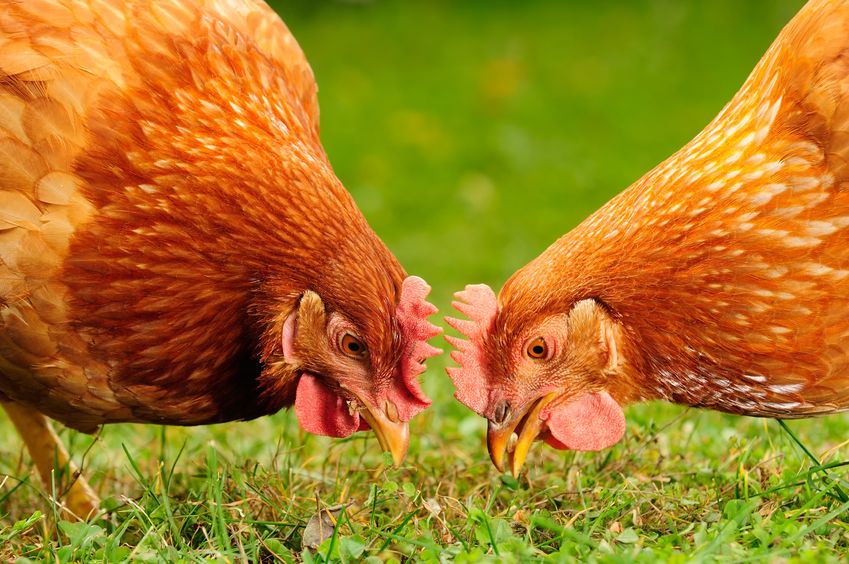
Restrictions have been extended across the whole of England after avian influenza was discovered in more wild birds.
Last week the UK's Chief Vet Nigel Gibbens ordered a prevention zone for parts of Dorset after highly pathogenic bird flu was confirmed in 17 wild birds.
The number has since increased to 31. Now, the Department for Environment, Food and Rural Affairs (Defra) says that avian influenza has been found in 13 wild birds in Warwickshire.
Both outbreaks involve H5N6 - a strain that has been circulating in wild birds across Europe in recent months.
An avian influenza prevention zone (AIPZ) was put in place around Weymouth and Portland after the discovery in Dorset last week in mainly mute swans.
Following the latest outbreak in the Midlands, involving mainly gulls, the chief vet has decided to order an AIPZ for the whole of England.
“Following the latest finding of bird flu in wild birds in Warwickshire, we are extending our action to help prevent the virus spreading to poultry and other domestic birds," said Mr Gibbens.
“Whether you keep just a few birds or thousands, you are now legally required to meet enhanced bio-security requirements and this is in your interests to do, to protect your birds from this highly infectious virus.”
'Not isolated'
Defra said it had taken swift action last week to put a local prevention zone in place. However, it said the latest discoveries showed that the disease was not isolated to a single site.
Consequently the decision had been taken to extend the prevention zone across the country as a precaution.
As a result of the order, poultry keepers will be required to maintain enhanced bio-security measures. These include feeding and watering birds indoors to minimise mixing with wild birds, minimising movement in and out of bird enclosures, cleaning and disinfecting footwear and keeping areas where birds live clean and tidy.
Keepers with more than 500 birds will also be required to take some extra bio-security measures, including restricting access to non-essential people, changing clothing and footwear before entering bird enclosures and cleaning and disinfecting vehicles.
Defra says that these measures will be in place until further notice and will be kept under regular review as part of the department's work monitoring the threat of AI.
Tighten biosecurity
Following the initial outbreak in Dorset, Robert Gooch, chief executive of the British Free Range Egg Producers Association (BFREPA), warned all egg producers to tighten levels of biosecurity following confirmation of the outbreak.
"All members should enhance their bio-security and be extra vigilant. The virus has travelled from Europe and passed across other parts of England to reach Dorset so we need to be extra cautious," he said.
Defra said the Dorset case was the first in the United Kingdom this winter, although it said it expected more over the coming days - an expectation that has been fulfilled.
Even before the winter period arrived, Nigel Gibbens had warned that it was only a matter of time before we saw another case of AI in the UK.
“As the virus has been circulating across Europe, this finding has not come as a surprise," he said last week.
“But it is vital that anyone who keeps birds - whether a few in a back garden or thousands on a farm - is vigilant for any signs of disease, reports suspect disease to APHA and maintains good bio-security to reduce the risk of their birds becoming infected.”
'Significant financial loss'
After the outbreak in Warwickshire and Dorset, farmers still aren't required to house their birds.
Last winter housing orders in the UK and other parts of the EU in response to AI outbreaks threatened the livelihoods of free range egg producers.
Under EU law at the time, free range birds could only be housed for 12 weeks before losing their free range status - leading to significant financial losses for farmers. The European Commission has now extended this derogation to 16 weeks.
Even if housing orders were now put in place, the extended derogation would last beyond the danger period for bird flu.
Last winter housing orders in the UK and other parts of the EU in response to AI outbreaks threatened the livelihoods of free range egg producers.
Under EU law at the time, free range birds could only be housed for 12 weeks before losing their free range status - leading to significant financial losses for farmers.
The European Commission has now extended this derogation to 16 weeks. Even if housing orders were now put in place, the extended derogation would now last beyond the danger period.
